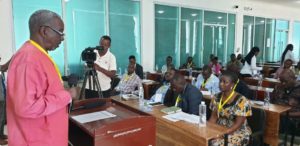BRING BACK INVESTIGATIVE JOURNALISM FOR THE PUBLIC INTERESTS

Jenerali Ulimwengu (left) giving a key note during side event panel discussion on Legal and Policy environment including working condition of Journalists held on May 2, 2024 at the Commemoration of World Press Freedom Day (WPFD) 2024 at the Kawawa Hall in the Jakaya Kikwete Conference Center in Dodoma
By Tumbi Kiganja
Dodoma. Media fraternities have been urged to revive an investigative journalism for the public interest. The statement was emphasized by media stakeholders during a side event panel discussion organized by the Media Council of Tanzania (MCT) in collaboration with the Legal and Human Rights Center (LHRC) held on May 2, 2024 leading up to the commemoration of World Press Freedom Day (WPFD), which is observed every May 3rd.
The discussion invited more than 80 participants from media industry, legal systems and human rights associations and discussed issues affecting journalists in their daily routine and came out with resolutions that they believed if they are worked on by the stakeholders themselves, the government and other partners can change the media landscape in the country.
As a result of the discussion that lasted for almost one and a half hours, the participants agreed that there is a need to revive a journalism that uncovers issues of public concern which produce researched and investigated stories and hold authorities accountable.
Others, the event discussed the need to push the political leadership that will observe the principles of democracy which lays foundation to allow friendly media legal and regulatory framework by reviewing the existing challenging laws including the Statistics Act which hinders journalists from conducting researched based stories.
Also the participants agreed that the government should push for enforcement and compliance of labour laws. This came after details emerged that currently more than 80% of journalists do not have job contracts and those who have are not paid salaries, nor covered in social securities’ schemes such as National Social Security Fund (NSSF), health insurance etc.
Giving an opening remark, the Executive Secretary of MCT, Ernest Sungura said that the objectives of the session was to provide an assessment on the working conditions of journalist in Tanzania on the legal, policy and institutional framework including the gender based violence in media houses.
The panel discussion was honored by Jenerali Ulimwengu as a key note speaker who gave a thorough overview of the legal and policy environment including working condition of journalists citing from the past and present situation pointing that today’s journalists are working on a most difficult environment.
There was also a panel discussion that involved three experts, a veteran journalist Salim Salim who discussed on safety and Security concerns for journalist in Tanzania, advocate James Marenga who spoke about the legal and policy and institutional framework regulating the media industry in Tanzania as well as a chairman of Journalist Workers Union of Tanzania (JOWUTA) – Mussa Juma who spoke about the employment and working Standards to Journalists in Tanzania
